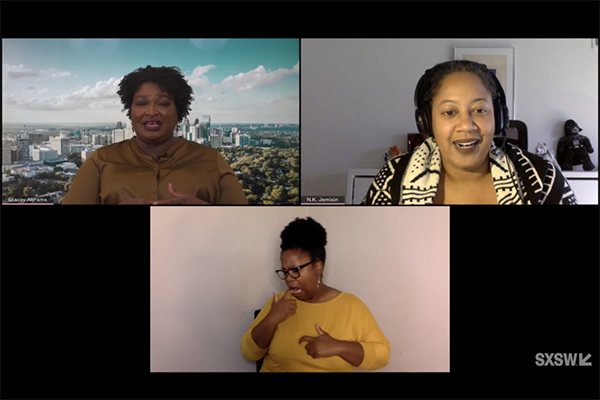Politician Stacey Abrams, author N.K. Jemisin talk about the power of storytelling at SXSW 2021
March 17, 2021
Janelle Monáe’s specially created music video for her song “Turntables” played at the beginning of South by Southwest 2021 keynote speaker Stacey Abrams’ conversation with author N.K. Jemisin, highlighting Abrams’ work against voter suppression.
Democratic politician and activist Abrams and Jemisin, author of “The City We Became,” discussed Tuesday how the power of storytelling can give citizens the blueprint to create the change they want to see in society.
“Center the narrative around the voter, the citizen, the person,” Abrams said. “If they can’t see themselves being victimized or benefiting, you give them a reason to not focus. Focus on centering the story around those communities who aren’t part of the narrative so they have a place to be heard.”
Abrams said when it comes to change, people’s first response is always opposition. The only way to combat that is by orchestrating the same idea in a different way.
“They say no one way, make them love it another way,” Abrams said. “It may not work out the way you intend, but that doesn’t relieve you from your responsibility.”
Abrams created three political advocacy organizations: voting rights organization Fair Fight, Fair Count, an organization that aims to include hard-to-count communities in the census, and the Southern Economic Advancement Project, an organization dedicated to creating equal public policy throughout the South.
In 2020, Abrams said she worked to engage the single-highest number of active voters of color in Georgian history, delivering a Democratic presidential candidate for the first time in 28 years as well as the state’s first Jewish senator and first Black senator. Now, Abrams said, 253 nationwide bills are being proposed to push back voting rights.
By informing people of their power as citizens, Abrams said individuals feel like they can change society, whether that be through COVID-19 relief, police reform or amending the criminal justice system.
“Protest (in) the streets, protest at the ballot boxes and protest (people) who are elected into power,” Abrams said. “We have to be present in the minds and faces of those in charge … part of our responsibility is to not just tell a chapter, but come back and tell what’s happened next.”
Abrams said politics is about creating the world citizens want to see. When individuals elect leaders who don’t want to see marginalized communities in the world, they try to cut them out of the narrative. Abrams emphasized how important it is for these communities to continually advocate to be included in the story.
From firsthand experience, Abrams discussed how people have viewed her as less capable because she is a Black woman.
“There is a discomfort with the audacity and capacity of people with color,” Abrams said. “When I was a candidate for becoming vice president, I was asked a question white men are never asked: Are you qualified?”
Abrams said power lies with the people, and it is their job to hold leaders accountable during elections and while they’re in office. Abrams said the problem is people don’t always know their power.
“It is important to know we are capable — yes, it is possible to succeed,” Abrams said. “We cannot declare we are less because then we are creating a false narrative.”











